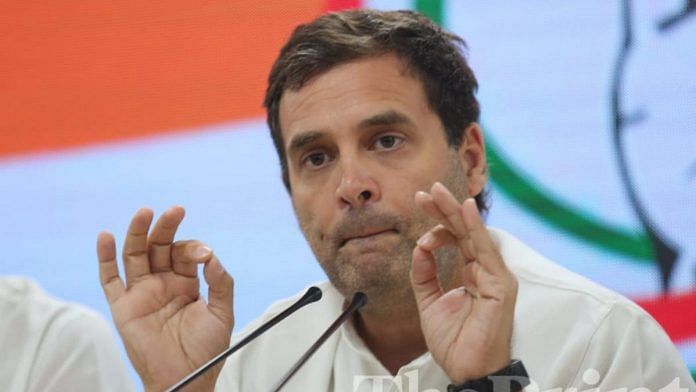Bengaluru: Congress president Rahul Gandhi’s decision to contest a Lok Sabha seat in the south — Wayanad in Kerala — is smart outreach strategy, but his party’s commitment to implement the recommendations of the Fifteenth Finance Commission on the devolution of central funds to the states will disappoint the region.
There are enough promises in the Congress’ manifesto, like granting Special Category status to Andhra Pradesh and full statehood for Puducherry, that the southern states will react to positively. But the assertion that “We will implement the recommendations of the Fifteenth Finance Commission and will urge the States to implement the recommendations of their respective Finance Commissions” sticks out like a sore thumb.
Although the manifesto doesn’t elaborate, it appears to suggest that the Congress agrees with the terms of reference of the Finance Commission, which has made the 2011 population census as the basis for devolution of central funds to the states.
The 15th Finance Commission was set up in 2017 with the mandate to distribute the net proceeds of taxes to the states until March 2025.
The southern states have been vehemently opposing the move to consider 2011 population census as the basis for devolution of central funds by the Finance Commission. They assert that the states that have complied with the family planning policy introduced after the 1971 census will lose out even as states with higher population growth rate continue to go unpunished.
Also read: Not just a ‘safe seat’ for Rahul Gandhi, Congress sees Wayanad as key to its southern revival
The southern states have diligently complied with the population policy to reduce their fertility rates to below the replacement level. At 1.6, the total fertility rate (TFR) for Tamil Nadu in 2016 was the lowest among the bigger states. The TFR for Andhra Pradesh and Telangana was 1.7, and for Karnataka and Kerala 1.8.
Voicing concern over the falling population growth rate in the state, Andhra Pradesh chief minister N Chandrababu Naidu had even announced that his government would incentivise couples who choose to have more than two children.
The issue of funds devolution by the Finance Commission had generated a lot of debate last year. Ironically, it was a Congress chief minister, Siddaramaiah of Karnataka, who had accused the Narendra Modi government of adopting measures on devolution of taxes that would “further affect the interests of the south”. He, and other finance ministers of the southern states, had met in April 2018 to adopt a common stance.
DMK leader M.K. Stalin had even written to chief ministers of 10 states, urging them to oppose the terms of reference of the 15th Finance Commission.
It is indeed surprising how Congress leader P Chidambaram, who headed the manifesto drafting committee, let such a promise appear in his party’s manifesto when he himself has said that the “Terms of Reference of XV Finance Commission (are) seriously flawed”.
Also read: For rich South India, the rest of the country is a tax burden
With the Congress now clearly promising to implement the recommendations of the 15th Finance Commission, leaders like Siddaramaiah and Stalin, with their respective parties in an alliance for the 2019 Lok Sabha elections in Tamil Nadu, will find themselves in a spot.
In the manifesto for the 2018 assembly elections in Karnataka, released by Rahul Gandhi himself, the Congress had stated that Karnataka, along with other southern states, would fight to ensure a fair share in the devolution of funds from the 15th Finance Commission.
It is likely that the Congress has something up its sleeve to keep the southern states happy while not changing the baseline year for devolution from 1971 to 2011. But what that thing could be, the manifesto doesn’t give a clue. For the Congress’ outreach strategy to appear sincere, it has to ensure that the southern states are not handed a raw deal. This becomes all the more important when the Congress’ prime ministerial candidate is seeking a mandate from the south.
On other points in the manifesto relevant to the southern states, where the regional parties like the TDP, DMK and TRS hold sway in Andhra Pradesh, Tamil Nadu and Telangana, respectively, the Congress can hope to earn a few brownie points.
For instance, in the section on “Federalism and Centre-State Relations,” the manifesto states that the “Congress acknowledges that, over the last 5 years, this principle (of federalism) had been eroded to the detriment of the States.”
For long, the regional parties in the south have been calling for better Centre-State relations. By talking about the spirit of federalism in the manifesto, the Congress can perhaps hope to project itself as more friendly towards the south as compared to the BJP.
The BJP is perceived as a party of the North, especially in Tamil Nadu, and has been criticised bitterly for its zeal to “impose” Hindi in the region. The language issue got a lot of traction in Karnataka, too, in the last couple of years, with a new-found stridency among pro-Kannada groups to oppose Hindi in signages in the Bengaluru Metro and National Highways.
As if in response to the Right-wing view that cultural homogeneity is intrinsic to Indian cultural tradition, the Congress has sought to emphasise the diversity of cultures. “A multi-cultural country like India can be truly proud of our many identities which deserve to be protected and preserved,” reads the party’s manifesto.
The author is an independent journalist based in Bengaluru.



